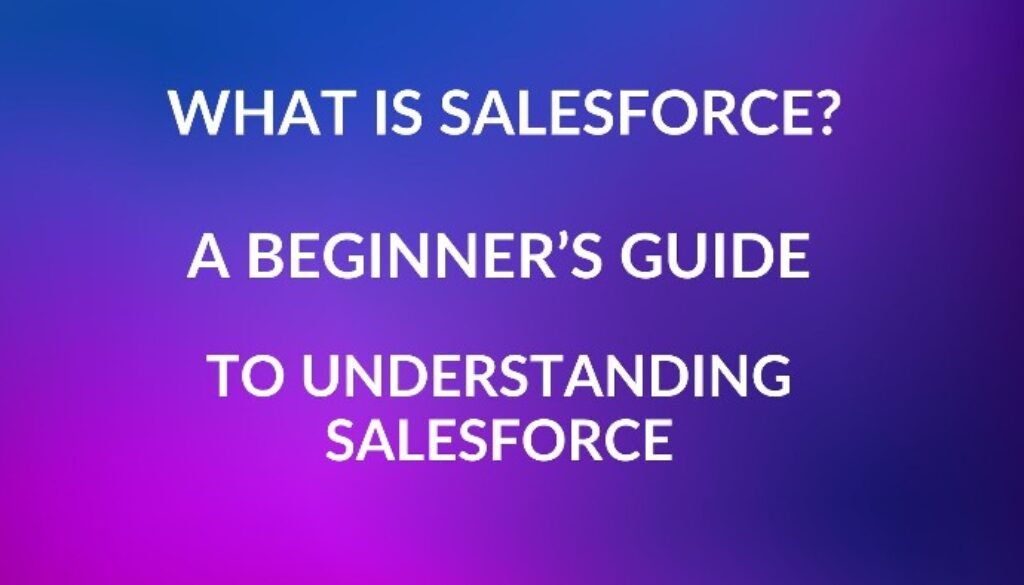What Is Salesforce? A Beginner’s Guide To Understanding Salesforce
1. What is Salesforce and how does it work?
Salesforce is a cloud-based customer relationship management (CRM) software that helps businesses manage their sales, marketing, customer service, and other key business functions in a single platform.
At its core, Salesforce is designed to help businesses track and manage their interactions with customers and prospects. It provides a centralized database where businesses can store information about their customers, such as contact details, purchase history, and communication history.
Salesforce allows businesses to automate and streamline many of their sales and marketing processes, such as lead management, opportunity tracking, and email marketing. It also provides advanced analytics and reporting capabilities to help businesses analyze their sales and marketing data and make informed decisions.
Salesforce works by using a combination of cloud computing, artificial intelligence, and automation tools to help businesses manage their customer relationships more effectively. The software is accessed through a web browser or mobile app, and users can access it from anywhere with an internet connection.
Overall, Salesforce is designed to help businesses improve their customer engagement, increase sales efficiency, and drive business growth through better customer relationship management.
2. History and growth of Salesforce
Salesforce was founded in 1999 by Marc Benioff, Parker Harris, Dave Moellenhoff, and Frank Dominguez in a rented San Francisco apartment. The founders wanted to create a new type of software that would allow businesses to manage their customer relationships more effectively.
In the early years, Salesforce faced stiff competition from established CRM vendors like Siebel Systems. However, the company was able to differentiate itself by focusing on delivering a cloud-based CRM platform that was more affordable, flexible, and easier to use than traditional on-premise software.
Salesforce’s growth accelerated in the early 2000s as more businesses started to adopt cloud computing. The company went public in 2004, and its stock price soared as investors recognized the potential for cloud-based software to disrupt the enterprise software market.
Over the years, Salesforce has continued to expand its product offerings and market reach. In addition to its core CRM platform, Salesforce now offers a range of products and services, including marketing automation, e-commerce, customer service, and analytics.
Salesforce has also made several strategic acquisitions to enhance its product offerings and expand into new markets. Notable acquisitions include the marketing automation platform ExactTarget (2013), the e-commerce platform Demandware (2016), and the data visualization company Tableau (2019).
Today, Salesforce is one of the world’s largest and most successful cloud software companies, with over 150,000 customers and more than 54,000 employees worldwide. The company has been recognized as one of the world’s most innovative companies by Forbes and one of the best places to work by Fortune.
3.Key features of Salesforce
Salesforce is a comprehensive CRM platform that offers a wide range of features and tools to help businesses manage their customer relationships more effectively. Some of the key features of Salesforce include:
Customer Relationship Management (CRM): Salesforce’s core offering is a CRM system that allows businesses to manage customer data, interactions, and communications in one centralized database.
Sales Automation: Salesforce provides tools to automate key sales processes, such as lead management, opportunity tracking, and forecasting, which can help businesses increase their sales efficiency.
Marketing Automation: Salesforce offers marketing automation features that help businesses automate and optimize their marketing campaigns, including email marketing, social media marketing, and advertising.
Customer Service: Salesforce provides a range of customer service tools, including case management, knowledge management, and service analytics, to help businesses provide better customer support.
Analytics and Reporting: Salesforce’s analytics and reporting tools allow businesses to analyze their customer data and track key performance metrics, such as sales revenue, customer acquisition costs, and customer satisfaction.
Mobile App: Salesforce provides a mobile app that allows users to access the platform from their mobile devices, enabling them to manage their customer relationships on-the-go.
Integration: Salesforce can be integrated with other business systems and applications, such as ERP systems, marketing automation platforms, and social media platforms, to create a seamless customer experience across multiple touchpoints.
Salesforce’s wide range of features and tools make it a powerful platform for businesses to manage their customer relationships and drive growth.
4.Cloud computing and Salesforce
Cloud computing is a technology that allows businesses to access computing resources, such as servers, storage, and applications, over the internet. Instead of hosting these resources on-premise, businesses can access them through a cloud provider, like Salesforce, who manages the infrastructure and provides the necessary software.
Salesforce is a cloud-based software platform that provides businesses with a range of cloud computing services, including CRM, marketing automation, e-commerce, customer service, and analytics. Here are some of the ways Salesforce leverages cloud computing technology:
Accessibility: Because Salesforce is a cloud-based platform, businesses can access it from anywhere with an internet connection. This makes it easy for businesses to manage their customer relationships and other key business functions, regardless of their physical location.
Scalability: Cloud computing allows businesses to scale their resources up or down as needed, depending on their changing business needs. With Salesforce, businesses can easily add new users, storage, and computing power to their platform as they grow.
Flexibility: Cloud computing provides businesses with greater flexibility in terms of how they use their computing resources. With Salesforce, businesses can customize their platform to meet their specific needs, integrating with other business systems and applications as needed.
Security: Cloud providers like Salesforce invest heavily in security measures to protect their customers’ data. Salesforce provides robust security features, including encryption, multi-factor authentication, and regular security audits, to ensure that customer data is kept safe and secure.
5.Benefits of using Salesforce for business
Salesforce is a powerful CRM platform that offers a wide range of benefits for businesses of all sizes and industries. Here are some of the key benefits of using Salesforce for business:
Better Customer Relationships: Salesforce provides businesses with a centralized platform for managing their customer data, interactions, and communications. This can help businesses build stronger relationships with their customers by providing them with personalized experiences and timely responses.
Increased Sales Efficiency: Salesforce’s sales automation features can help businesses streamline their sales processes, reducing the time and effort required to manage leads, opportunities, and sales forecasts. This can help businesses increase their sales efficiency and close more deals.
Enhanced Marketing Effectiveness: Salesforce’s marketing automation tools can help businesses automate and optimize their marketing campaigns, increasing the effectiveness of their marketing efforts and improving their ROI.
Improved Customer Service: Salesforce’s customer service tools can help businesses provide better support to their customers, including faster response times, more personalized interactions, and more effective issue resolution.
Data-Driven Insights: Salesforce’s analytics and reporting tools provide businesses with real-time insights into their customer data, enabling them to make data-driven decisions and optimize their business processes.
Scalability: Salesforce is a cloud-based platform, which means that businesses can easily scale their resources up or down as needed, depending on their changing business needs.
Flexibility: Salesforce can be customized to meet the specific needs of businesses across industries, and can be integrated with other business systems and applications to create a seamless customer experience.
Salesforce provides businesses with a comprehensive platform for managing their customer relationships and driving growth, and its wide range of features and tools make it a powerful solution for businesses of all sizes and industries.
6.Customer relationship management (CRM) with Salesforce
Salesforce is a powerful Customer Relationship Management (CRM) platform that provides businesses with a range of tools and features for managing their customer relationships. Here are some of the ways that Salesforce can help businesses with CRM:
Centralized Customer Data: Salesforce provides businesses with a centralized database for storing and managing customer data, including contact information, communication history, and purchase history. This can help businesses gain a complete view of their customers and improve their interactions with them.
Lead and Opportunity Management: Salesforce’s lead and opportunity management features allow businesses to track their sales pipeline and manage their sales process more effectively. This can help businesses prioritize their leads, identify key opportunities, and close more deals.
Marketing Automation: Salesforce’s marketing automation features enable businesses to automate and optimize their marketing campaigns, including email marketing, social media marketing, and advertising. This can help businesses generate more leads, nurture their leads, and increase their conversions.
Customer Service Management: Salesforce’s customer service management features enable businesses to manage their customer support interactions more effectively, including case management, knowledge management, and service analytics. This can help businesses provide faster response times, more personalized interactions, and more effective issue resolution.
Analytics and Reporting: Salesforce’s analytics and reporting tools enable businesses to analyze their customer data and track key performance metrics, such as sales revenue, customer acquisition costs, and customer satisfaction. This can help businesses make data-driven decisions and optimize their business processes.
Salesforce provides businesses with a comprehensive CRM platform that can help them manage their customer relationships more effectively and drive growth. Its wide range of features and tools make it a powerful solution for businesses of all sizes and industries.
7. Salesforce automation and process automation
Salesforce provides businesses with a range of automation tools to help them streamline their business processes and increase efficiency. Here are two types of automation that are commonly used in Salesforce:
Salesforce Automation: Salesforce automation tools are designed to automate various sales and marketing tasks, including lead and opportunity management, email marketing, and customer service. For example, businesses can use Salesforce automation to automatically send follow-up emails to leads, assign tasks to sales reps, and notify customer service agents when a case is escalated.
Process Automation: Process automation tools are designed to automate business processes across different departments and systems. For example, businesses can use Salesforce’s Process Builder to create custom workflows that automate tasks such as data entry, record updates, and email notifications. This can help businesses save time and reduce errors by automating repetitive or manual tasks.
Both Salesforce automation and process automation can help businesses increase their efficiency, improve their customer relationships, and drive growth. By automating routine tasks, businesses can free up their employees to focus on higher-level tasks that require more creativity and problem-solving skills. Additionally, automation can help businesses reduce errors and improve data accuracy, which can lead to better decision-making and improved business outcomes.
8. Salesforce integration with other systems
Salesforce is designed to be a flexible and extensible platform that can be integrated with other systems and applications. Here are some of the ways that Salesforce can be integrated with other systems:
Application Programming Interfaces (APIs): Salesforce provides a range of APIs that enable developers to integrate Salesforce with other systems and applications. For example, businesses can use the Salesforce REST API to integrate Salesforce with external websites and mobile applications.
Integration Middleware: Middleware platforms such as MuleSoft and Dell Boomi can be used to connect Salesforce with other systems and applications, including ERP systems, accounting software, and marketing automation platforms. These platforms provide pre-built connectors and tools to help businesses quickly and easily integrate Salesforce with other systems.
Custom Development: Businesses can also develop custom integrations to connect Salesforce with other systems. For example, businesses can use Salesforce’s Apex programming language to develop custom integrations with other systems, or they can use third-party tools such as Zapier or Workato to build custom workflows and integrations.
By integrating Salesforce with other systems, businesses can gain a complete view of their customers and improve their business processes. For example, by integrating Salesforce with an ERP system, businesses can streamline their order management and fulfillment processes, and by integrating Salesforce with a marketing automation platform, businesses can improve their lead generation and nurture campaigns. Overall, Salesforce’s flexibility and extensibility make it a powerful platform for integrating with other systems and applications, enabling businesses to achieve their business goals more effectively.
9. Security and data privacy in Salesforce
Salesforce is committed to providing a secure and trustworthy platform for its users and takes data security and privacy seriously. Here are some of the security and data privacy features of Salesforce:
Data Encryption: Salesforce provides encryption at rest and in transit, ensuring that customer data is always encrypted when it is stored or transmitted. Additionally, Salesforce provides a range of encryption key management options, including customer-managed keys, to give customers more control over their data.
User Authentication and Authorization: Salesforce provides a range of user authentication and authorization features, including two-factor authentication, single sign-on (SSO), and role-based access controls, to ensure that only authorized users have access to customer data.
Data Backup and Recovery: Salesforce provides automated data backup and recovery capabilities, enabling businesses to quickly and easily restore their data in the event of a data loss or system failure.
Compliance: Salesforce complies with a range of data protection and privacy regulations, including GDPR, HIPAA, and CCPA. Additionally, Salesforce undergoes regular third-party audits and certifications, including SOC 2 Type II and ISO 27001, to ensure that its security and data privacy controls are effective and up-to-date.
Data Privacy Controls: Salesforce provides a range of data privacy controls, including data retention policies and data anonymization features, to help businesses comply with data protection regulations and protect customer data.
Salesforce provides a robust and comprehensive set of security and data privacy features that enable businesses to protect their customer data and comply with data protection regulations. By using Salesforce, businesses can be confident that their customer data is safe and secure, enabling them to focus on growing their business and delivering value to their customers.
10. Salesforce training and certifications for beginners
Salesforce offers a range of training and certification programs for beginners who are new to the platform. Here are some of the programs that beginners can take to get started with Salesforce:
Trailhead: Trailhead is Salesforce’s free, online learning platform that provides a range of interactive tutorials and modules that cover a variety of Salesforce topics. Beginners can start with the “Trailhead Basics” module, which provides an overview of Salesforce and its key features, and then progress to more advanced modules based on their interests and career goals.
Salesforce Administrator Certification: The Salesforce Administrator Certification is designed for beginners who want to learn how to manage and customize Salesforce for their organization. The certification covers a range of topics, including data management, security, automation, and reporting, and requires passing a multiple-choice exam.
Salesforce App Builder Certification: The Salesforce App Builder Certification is designed for beginners who want to learn how to build custom applications on the Salesforce platform. The certification covers a range of topics, including data modeling, user interfaces, and business logic, and requires passing a multiple-choice exam.
Trailmixes: Trailmixes are curated collections of Trailhead modules that are designed to help beginners learn about specific Salesforce topics or technologies. For example, beginners can take the “Salesforce Essentials” Trailmix to learn the basics of Salesforce, or they can take the “Salesforce Platform App Builder” Trailmix to learn how to build custom applications on the platform.
Salesforce provides a range of training and certification programs that are designed to help beginners learn about the platform and its key features. By taking these programs, beginners can gain the skills and knowledge they need to become proficient Salesforce users and advance their careers in the Salesforce ecosystem.
If you want join salesforce classes in Pune & salesforce classes online please call us on 9545022110 & visit https://victoriousdigital.in




